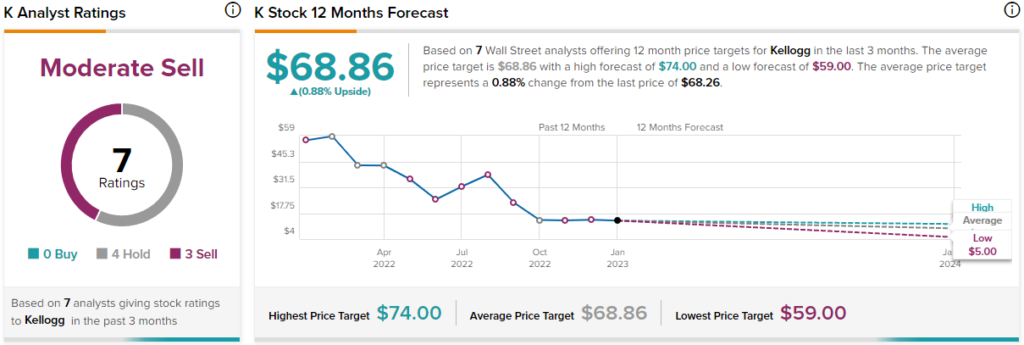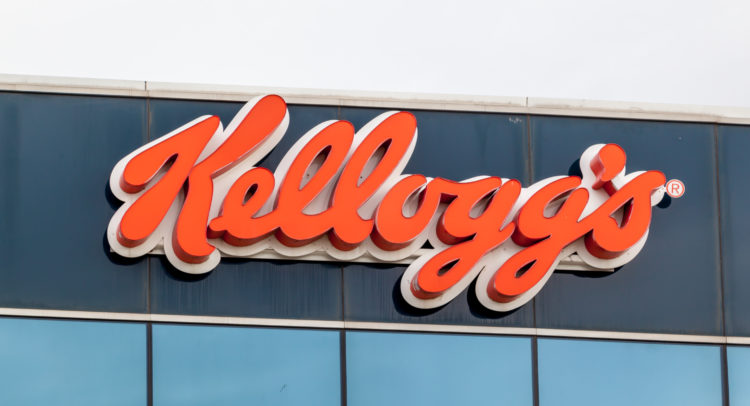On paper, the plant-based meat industry should catch on like wildfire, with millennials particularly gravitating toward fake meat. Unfortunately, several direct players in this arena struggled, making the foray of Kellogg (NYSE:K) questionable. Nevertheless, the company potentially offers the right stuff to succeed where others failed. Therefore, I am bullish on K stock.
Elevate Your Investing Strategy:
- Take advantage of TipRanks Premium at 50% off! Unlock powerful investing tools, advanced data, and expert analyst insights to help you invest with confidence.
Fundamentally, the wider framework for Kellogg presents an enticing pull. At the top, the political machinery in Washington continues to promote climate-related initiatives aimed at bolstering sustainability. Logically, the proliferation of plant-based meat over animal-based products represents an important cog in the go-green directive, thus theoretically bolstering K stock.
Additionally, millennials love plant-based products. Ample research prior to the COVID-19 crisis indicated that more than 50% of millennials attempted to incorporate plant-based food into their diet. Again, this should bode very well for K stock and especially direct-play fake meat providers.
Unfortunately, the facts don’t yet support the ambition. As several analysts pointed out, notable brands in the field, such as Beyond Meat (NASDAQ:BYND) struggled for traction. In BYND’s case, it lost about 73% of its value in the trailing year. In contrast, K stock gained over 11% during the same period. Plus, Beyond Meat sadly continues to struggle financially.

Stated differently, Kellogg might not want to get caught up in the fake meat mess. However, its potential success may come down to superior scale.
K Stock and the Scale Advantage
When consumers (especially the younger cohort) proclaim they love plant-based food, no one should assume an ulterior agenda. By most indications, open-minded consumers appreciate fake meat and perhaps its broader positive implications. However, the overriding criticism of the sector centers on cost. Bluntly, fake meat rings up the register at a higher price than the real deal, and that comes down to economies of scale.
Simply put, animal-meat producers operate at a massive scale compared to their plant-based counterparts. Therefore, the fake meat providers can talk all they want about green protocols and initiatives and superior outcomes. However, at the end of the day, if similar products feature steep price variances, consumers will gravitate toward the cheaper offering.
Moreover, while it’s true that McKinsey & Company reported a consumer willingness to pay for sustainable-sourced products (from an article written in 2012), the company stated that “as the premium increases, the willingness to pay melts away. For all but one category (packaging), less than 10 percent of consumers said they would choose green products if the premium rose to 25 percent.”
Still, the fundamental challenges associated with making plant-based endeavors viable give K stock a huge advantage. Essentially, the underlying company can leverage its massive resources to truly make a (profitable) dent in fake meat.
While it’s not a fair comparison, investors should consider the harsh realities. Beyond Meat’s enterprise value pings at $1.86 billion. In contrast, Kellogg’s enterprise value clocks in at over $30 billion. If anybody can do fake meat, it’s the latter enterprise. Therefore, K stock deserves closer examination.
Not Exciting but Profitable
Now, to be completely fair, no one will confuse K stock as an exciting venture. Indeed, to receive the good-to-be-alive euphoria, speculators may be better off gambling on pure-play fake meat providers. However, for a slow-and-steady approach to an emerging industry, Kellogg offers the most credibility.
Ultimately, it’s all in the financials. Currently, Kellogg’s operating and net margins stand at 10.93% and 10.01%, respectively. Both metrics rate considerably higher than their respective industry median values, which rate in the single digits. Also, while Kellogg certainly isn’t a growth machine like its pure-play counterparts, it’s still moving (albeit at a middling pace).
For full disclosure, investors won’t be getting a great deal on K stock. Presently, the market prices Kellogg at a trailing multiple of 15.8. It’s a decent figure, ranking better than nearly 56% of the competition. However, it’s nowhere near what most investors would call a steal.
No, those interested in K stock would typically have the mentality that a 5% annual return ranks far better than the potential of 500% profits gone unrealized.
Is K Stock a Buy, According to Analysts?
Turning to Wall Street, K stock has a Moderate Sell consensus rating based on zero Buys, four Holds, and three Sell ratings. The average K price target is $68.86, implying just 0.9% upside potential.

The Takeaway: K Stock Gets You There Slowly
Without question, the plant-based food industry offers plenty of upside potential. In particular, millennials love the underlying products. As they age and their spending power increases, what millennials think will matter greatly.
However, pure-play fake meat providers have so far struggled for traction. While they may one day find positive footing, some contenders might not go the distance. On the other hand, the slow and lumbering Kellogg enjoys the massive scale to make alternative meat viable. Therefore, while K stock may be boring as heck, it will get you to the plant-based promised land…eventually.
















